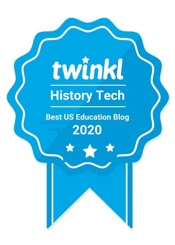Kids don’t hate history, they hate the way we teach it

About 15 years ago, I had the chance to drive James Loewen around for a couple of days. He was in town for a two day workshop and afterwards had to get to Kansas City for a flight. As his chauffeur, I got the chance to pepper him with all sorts of questions. And much of what I wanted to know revolved around his most recent book at the time, Lies My Teacher Told Me: Everything Your American History Textbook Got Wrong.
I was especially curious about the first few sentences in the book:
High school students hate history. When they list their favorite subjects, history always comes in last. They consider it “the most irrelevant” of 21 school subjects, not applicable to life today. “Boring” is the adjective they apply to it. When they can, they avoid it . . .
Once I got him started, Loewen went on to describe the incredible amounts of money being made by movie producers and book publishers who focused on historical topics. At the time, the viewing and reading public was fascinated with movies such as Dances with Wolves, JFK, Saving Private Ryan, and Gone with the Wind and books like Gore Vidal’s Lincoln and David McCullough’s John Adams.
Recent examples would be movies Lincoln and Zero Dark Thirty – or books like Unbroken and Killing Kennedy.
He was very clear about it:
Kids don’t hate history. They hate the way we teach it.
I couldn’t agree more.
Kids don’t hate history lectures. Not if it’s done in an engaging style with images and great questions and small groups and problems to solve. What they hate is required, graded outlined notes without context or purpose. They hate 45 minute monologues without a chance to ever interact with the content. They hate listening to what Loewen calls a list of stuff presented as “one damn thing after another.”
Kids don’t hate historical characters. Not when we tell them stories of actual people and how they survived the Kansas winter of 1874 or a teenager’s experience during the Montgomery Bus Boycott or a trip from Haiti to the Florida Keys on a homemade raft or an escape from a World War II concentration camp or . . . well, just about any event well told. What they hate are long lists of people that show up on the matching section of chapter tests for no reason at all.
Kids don’t hate maps. Maps tell incredible stories. They draw the viewer in with what Robert Louis Stevenson called the power of “infinite, eloquent suggestion.” Miles Harvey, author of The Island of Lost Maps, understands what a good map can do:
Sometimes a map speaks in terms of physical geography, but just as often it muses on the jagged terrain of the heart, the distant vistas of memory or the fantastic landscape of dreams.
Kids hate adding all of the major rivers and bodies of water to a bare outline map of the United States. They hate being graded on whether they used the correct color for labeling the 108 counties of Kansas.
Kids don’t hate reading and writing. My older son and his friends are huge fans of The Game of Thrones. They’ve got the books, they write fan fiction, they read and comment on blogs. They read immense amounts of non-fiction and informational text. What they hate is not having any choice in what they read and write about. What they hate is writing for just their classroom teachers and not someone “real.” They hate using paper and pencil when computers and mobile devices are everywhere.
Kids don’t hate doing homework. Ask them to do something authentic like making an iMovie trailer or playing a video game or talking to Iraqi war vets and they will jump all over it. What they hate is dragging home packets of worksheets that are basically copy and paste with a pencil. They hate having homework count as 50% of their grade and being called cheaters if they work with others to solve problems.
Kids don’t hate memorizing stuff. Are you kidding me? They memorize stuff all the time. Songs, video game walk-throughs, movie plots, the names of every one of the kids in the 4th grade class they visit once a week for Big Brothers / Big Sisters. What they hate is memorizing stuff that they know they will never actually use. What they hate is that they know we know they will never use that stuff. They hate being graded on their ability to memorize stuff that they can find on Google or with Siri in 60 seconds.
They don’t hate history. Not when it’s done well – with relevancy and choice and small groups and engaging problems and interesting documents and outside experts and technology and authentic products.
They hate the way we teach it.
—–
(Thanks for the reminder, John Spencer.)
Trackbacks & Pingbacks
- Kids don't hate history, they hate the way we teach it | The World of Online Learning | Scoop.it
- #MustRead Shares (weekly) | it's about learning
- Kids don’t hate history, they hate the way we teach it by @glennw98 | Remix Teaching
- Kids Hate How We Teach History, Not the Subject Itself. | INTC3610
- Kids don’t hate history
- Kids don't hate history, they hate the way we t...
- Cool GenStuff - Monday 29 July 2013 | Hack Genealogy
- There is No Such Thing as a “Digital Native” | Exploring the Past
- Things that suck and your social studies classroom | History Tech
- Should We Try to Make History "Relevant" to Students?
- What’s your social studies ROI? | History Tech
- 4 things I learned during my #civilwarsupertour | History Tech
- Calculating your Social Studies ROI. Cause it’s #refreshfriday | History Tech
- You’ve got a bit of free time – perfect opportunity to head over to Anti-Social Studies. (Cause you need their stuff!) | History Tech
















Could not agree more Glenn!
You hit the nail right on the head with this one Glenn, and the last two paragraphs bang it down all the way!!
I appreciate the comment! Glad you enjoyed it. (I am still using some of your ideas from the NCSS conference from November hen I work with teachers.)
glennw
You are so right! I’m teaching history for the first time ever to 5/6 graders. I’ve had to relearn all of it because I just read, memorized, answered questions at end of chapters, took test when I was in high school. BORING!!
I’m in love with it now!! I hope my kids are as well. 🙂
Shannon
http://www.irunreadteach.wordpress.com
My wife teaches 4th graders and she was the same way. Not much history background and so has had to re-learn it. Done well, history is the best! Done poorly, well . . . not so much.
So glad you’re loving it! Your kids will notice and get sucked in because of you. Good luck! Let me know if I can help in any way.
glennw
Good post. I think we are so lucky as history teachers that we can really use any point in history as an entry point and build forwards, backwards and sideways. I used to think that kids had to know “x” and “y” before they could understand “z” until I realized that when I got to “z” they had forgotten “x” and “y.” If we find out what is intriguing and start there, then they are motivated to learn. I have been thinking about what an all – elective curriculum would look like.
I like your idea of being able to start anywhere! I’ve thought about thematic teaching but really had thought about it the way you’ve described. History can be like that – we can start anywhere and go back and forth. Here in Kansas, we’ve tried to do something like that with our new standards. Focus on the process rather than the content.
The conversation we have been having, and I think it’s a good one, is whether or not there is a basic set of foundational knowledge that we all need to have. Is there, and should there be, a core collection of social studies stuff that all Americans need to possess? And if we do, how do we deliver that content in a way that still incorporates the brain research on how kids learn best?
Thanks for the comment!
glennw
Love this! I 100% agree and I’m trying my hardest every day to make history real to my students. At the middle school level, I have lots of interpersonal learners who need to “feel” the content to really understand it. I can do that through our discussions, our in-class activities, and the way I choose to assess them.
Heidi,
I used to teach middle school – they’re a fun group but you’re right, they especially can be hard to engage with. I appreciate you trying our “hardest.” We need more teachers like you!
Thanks for the comment!
glennw
Absolutely spot on! Thanks Glenn
Deb,
Thanks for the comment!
glennw
Fabulous post. The details, the storyline, the truth conveyed. Bravo! And thank you.
Glad you enjoyed it! I had fun writing it.
Thanks for the comment!
glennw
Oh, but those tests. Those lovely end of the year tests that the teachers are evaluated on and the states spend hundreds of millions on!
Reblogged this on Indiana Jen.
Reblogged this on My Wired Life and commented:
Wow — an excellent post on the state of history education today. As a professional historian and a history-museum-educator, we see this frequently. We see visitors to museums and historic sites talk about how they hated history in high school, but love learning about history in our museum. Why? Because we tell stories. We make it relevant, real and human. History isn’t about filling in bubbles on a test.
Thanks, History Tech, and Thanks, Indiana Jen for reblogging it so I saw it.
Thanks for the comment! And you’re right, history is all about telling stories. We need to do more of that AND encourage our kids to be a larger part of the telling.
Keep up the great work!
glennw
Reblogged this on risangbaskara.
Our small history based video company has been trying to tell the word this for four years. Look at our You Tube channel. History presented the way it should be.
Some students don’t like history regardless of how it’s taught. I agree that relevancy is key, but the standards decide what is taught and not the students. Also, such a large portion of time is spent on wars and battles, hardly a balanced portrait of the human experience. Given this disconnect, why not just let students who find history irrelevant simply opt out of it? Bottom line is, if you engage them you get to keep them!
Mixo,
The standards can be very restricting. We’re lucky in Kansas in that our standards are not based on content but on Big Ideas. So here teachers have more freedom to decide what is “covered.” Giving them a better chance to engage kids.
Thanks for the comment!
glennw
My college freshmen regard history as boring — an attitude left over from high school. If I engage them with interesting questions or funny stories, with a web quest, or a short video, many will at least tolerate it. But often students regard history as well as other humanities electives as required course work one has to take along with more important things that “really count” (as one student put it) toward a major. College, at least at the community college level, is viewed as a jobs training ground. Few view history as leading to a paycheck and thus find it useless. How many historians can be absorbed into the workforce? But, the bright side is if you can somehow relate what you teach to basic human rights, freedoms and other global issues in the news, history becomes more essential. It is a trick to relate history to the current economic market. Try assignments that use the web, current news events, TV documentaries. Allow a day when they can use their I-phones in class as a research tool. If you can arrange a trip to a local museum, do a scavenger hunt or let them choose a favorite display for a report. Always allow some choice in reading and writing assignments.Allowing choice is easier in college than in high school, when you always have to teach to the state test. I have also found that some students dislike history because they do not read or write that well. They lack basic grade school skills necessary for high school much less college.
Thanks for the comment! I agree – I think that there are too many K-12 history / social studies teachers who have not found effective ways to connect their content to students. And that does make it difficult post HS. I recently wrote about how we can better prep our kids for the “real” world and used a quote from Quartz:
A recent article by Marie Myung-Ok Lee highlights why our task is so vital:
“Today, in a time of economic uncertainty, many students are being encouraged to skip history and other liberal arts classes in favor of a practical STEM focus. But (the rise of fake news during) this election has shown that nothing could be more practical for Americans than a deep immersion in our country’s history.
Do we want higher education merely to produce workers, or do we want students equipped with the skills to understand, question, create? History does much more than prepare people to become professional historians. It teaches us how to think – that is, how to do the high-level analysis that is essential for an informed society. It requires analysis of data and deep research, as well as the use of archival and primary sources. Such skills are absolutely critical in an era that is increasingly characterized by the relentless bombardment of information.”
Liberal arts and the humanities are an incredibly important part of any K-16 education – I like how we can use the idea of STEAM to help students see connections. And you’re right . . . it is vital that we connect the past with current contemporary issues. The ideas of human rights, universal truths, and global quality of life issues are things that can help students see the importance of history and social studies.
It becomes our task to help kids make those connections.
Thanks for taking the time to write – good luck as you continue to change the world through what you do!
glennw
I am in 5th grade and I ABSOLUTLEY HATE social studies. My mom thinks i have a social studies brain and i go on and on about what i learn. but at school, its not enjoyable. I agree with you!! 😁
Lelia,
I’m sorry to hear that you’re not enjoying social studies right now! My wife is a fifth grade teacher and at the beginning of the school year, she often hears similar comments from her students. But many soon change their minds because she and the other teachers work hard to find ways of connecting the past with current events and great books. I’m hoping you’ll have a chance in middle school and high school to be in a class that focuses on doing history rather than just memorizing stuff! Maybe you’ll change your mind.
Till than, ask your mom (and your school’s media specialist and librarian) to help you connect with things you’re interested in. These might be books, websites, or video games.
I’m not sure what your interests are but you might like a new book called March. It’s a graphic novel by a guy named John Lewis who stood up to injustice and racism. (it’s actually a series of books – ask your teacher or librarian to see if they can help you get it.) You might also like a book called Out of the Dust about a girl named Billie Jo growing up in Oklahoma who has to find ways to survive all sorts of problems.
There is a website called You Are the Historian that my daughter really enjoyed. You have to use clues to solve figure out a mystery. Find it at: https://www.plimoth.org/learn/just-kids/thanksgiving-interactive-you-are-historian
I’m also a big believer in playing games and simulations. Find some simulations to play at: http://www.mission-us.org/pages/landing-mission-5 This one goes along with some of the same things that Billie Jo deals with. You might like trying to stop disasters from happening when you play a simulation called Stop Disasters at http://www.stopdisastersgame.org/en/home.html.
My kids also really likde a game called Pursued. You’re a spy that escapes and has to use clues from Google Streetview images to figure out where you are so that you can be rescued. Try it at: http://pursued.nemesys.hu/
You’re right. Social Studies definitely should NOT be boring! It should be about figuring out problems and learning cool stuff about people and helping others and arguing about new ideas. So don’t be afraid to talk to your teacher about some of these things and be sure to ask your mom to help. If she wants, tell her to send me an email at glennw@essdack.org.
glennw
Just one niggle about the essay: It’s Robert LOUIS Stevenson, not Lewis.
Dave,
My bad!
Thanks for catching that.
glennw